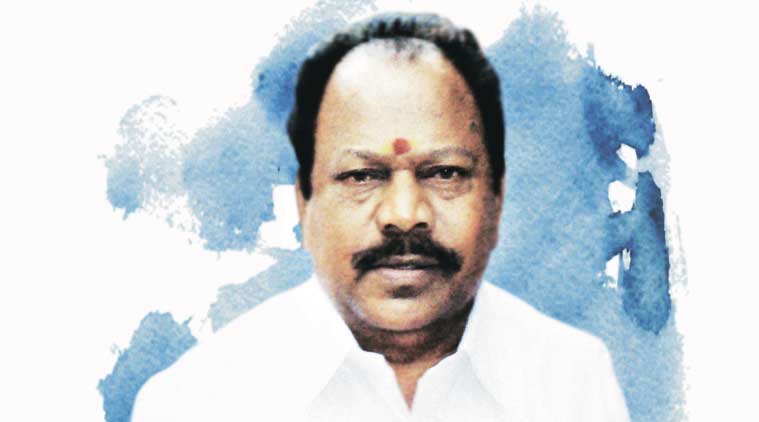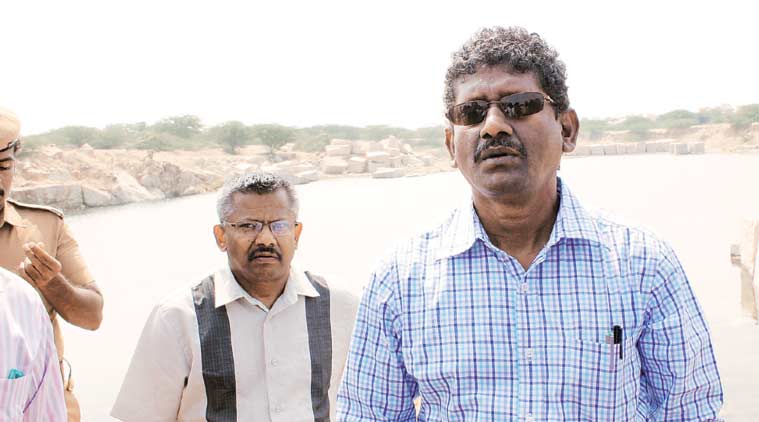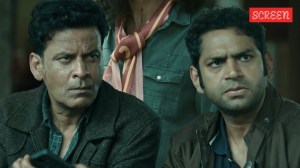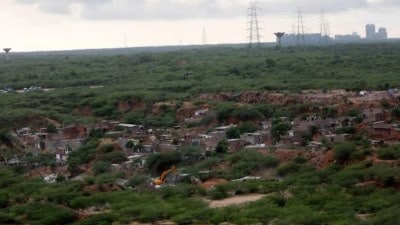Stay updated with the latest - Click here to follow us on Instagram
Lord of the quarries: The murky world of mining and the politics that sustains it
Arun Janardhanan tells the story of the mining baron and his empire, the murky world of mining and the politics that sustains it.
 Palanichami’s PRP Granites, the mining company he set up in Melur in 1992-93, is now the country’s largest exporter of granite, worth around Rs 20,000 crore.
Palanichami’s PRP Granites, the mining company he set up in Melur in 1992-93, is now the country’s largest exporter of granite, worth around Rs 20,000 crore.
A week after skeletal remains of six persons were dug up from a quarry owned by granite businessman P R Palanichami in Madurai, Arun Janardhanan tells the story of the mining baron and his empire, the murky world of mining and the politics that sustains it.
In the early 1990s, P R Palanichami, a small-time PWD contractor, bought a few acres in Melur, 90 km from his village near Andipatti in Tamil Nadu’s Theni district and 35 km from the temple town of Madurai. The hills and the earth of Melur were rich in granite, that pink-hued rock which businessmen like Palanichami mined to make granite powder (used to draw kolam or rangoli) and which is used in appliances such as wet grinders. Almost every household in Melur had a secret granite quarry in its backyard. But very few in Melur knew the riches these rocks held.
Palanichami didn’t either, but he found out soon enough. His PRP Granites, the mining company he set up in Melur in 1992-93, is now the country’s largest exporter of granite, worth around Rs 20,000 crore, with quarries spread over 35,000 acres across Tamil Nadu and even beyond the state boundaries.
READ: Skeletal remains found in Tamil Nadu: Another ‘witness’ says he saw sacrifice
For over five years now, Palanichami and his company have also been at the centre of a probe into the alleged multi-crore granite mining scam, by a committee appointed by the Madras High Court. What’s playing out as a macabre sideshow is the story of alleged human sacrifices, allegedly carried out by Palanichami’s associates each time the firm expanded its business.
WATCH VIDEO: Tamil Nadu ‘Human Sacrifice’ : Second ‘Witness’ Who Also Took Part In The Ritual
Last week, Palanichami was questioned after skeletal remains of six persons, including that of a child, were dug up from one of his quarries in Melur. The court-ordered committee, headed by former Madurai collector U Sagayam, had ordered the exhumation following a complaint by a former employee of PRP Granites. M Sevarkodiyan, who worked with PRP Granites as a driver from 1998 to 2003, alleged that he was told to pick mentally ill people from the streets, feed them well and drop them at the company headquarters. He also claimed to have witnessed the burial of two mentally ill persons he had picked from the streets.
A police officer said, “They were killed in the manner animals are sacrificed.The body parts had coconuts tied to them.”
But all these years, Palanichami himself remained largely unseen, running his operations through a close-knit network of people, key among them his nephew
K Murugesan. Murugesan is known to be the public face of PRP Granite’s operations — fixing and breaking deals.
READ: Before their murder, we picked up the mentally ill and fed them: M Sevarkodiyan
M Sevarkodiyan, who is now a witness in the alleged human sacrifice case, calls Palanichami “a soft-spoken man”. “Palanichami is uneducated like me. The entire PRP Group is actually controlled by Murugesan,” he says.
Palanichami, now in his mid-60s, belongs to the Piramalai Kallar caste, one of the three related castes of Tamil Nadu that constitute the Mukkalathurs, also collectively known as Thevars, a politically powerful OBC group.
Palanichami’s lawyer V R Manoharan points out that his client made it big despite his humble beginnings and his limited education. “He must not have studied beyond Class V. Had he studied further, he would have become the Bill Gates of India. He is ignorant… nobody told him he could start a college or school like some of the other rich men in Tamil Nadu did. But he has sponsored beds in government hospitals. He is god-fearing, visits temples everyday, provides meals to his workers three times a day,” says Manoharan, adding that Palanichami will not talk to media “since the matter is being probed by multiple agencies and the court”.
* * *
The story of how this “soft-spoken”, “god-fearing” contractor rose to become India’s largest granite exporter is tied to the murky world of Tamil Nadu’s illegal mining network and the politics that feeds it.
Around 1995, as countries in the West imposed tough conditions on granite quarrying, businessmen such as Palanichami struck gold. He started large-scale quarrying in Melur and sealed export deals, earning crores over the next decade and a half.
 As the mining companies stepped up their operations, the landscape of Melur changed beyond recognition. (Source: Express Photo)
As the mining companies stepped up their operations, the landscape of Melur changed beyond recognition. (Source: Express Photo)
Accolades followed. His PRP Granites bagged the ‘Outstanding Export Performance’ award from the Chemical and Allied Export Promotion Council of India (Capexil), a body set up by the Union Ministry of Commerce and Industry. The company also won the ‘Best Exporter’ award from the Federation of Indian Chamber of Commerce and Industry and, for four years, the company won the Federation of Indian Export Organisation’s ‘Niryat Shree’ bronze trophy for ‘excellence in exports’. Emails sent to Capexil seeking details of the award got no replies. However, an official associated with Capexil said the awards were “purely based on the quantity of exports”.
READ: Tamil Nadu ‘human sacrifice’: Family seeks probe into child’s murder
It was a change in government policy in the 1990s that threw open possibilities for mining businessmen such as Palanichami. Until then, Tamil Nadu Minerals Limited had a monopoly over mining rights in the state. But in 1992, during Jayalalithaa’s first term as chief minister, the government allowed private mining. The state then leased out land and issued close to 200 licences to private miners. “But, as we see in many other sectors, these licences began to be handed out as favours and private miners indulged in illicit granite mining,” says K Palaniappan, a retired government official in Melur.
According to a report prepared by Sagayam when he was district collector of Madurai, in 2011, officials granted 175 illegal leases across 43 revenue villages in Melur taluk. Another report, submitted by Sagayam’s successor Anshul Mishra to the Madras High Court in 2012, said that at that point, there were nearly 1.7 lakh granite blocks lying in Madurai.
Less than 20 years after the change in mining policy, Melur had created its mining barons, prominent among them Palanichami and Durai Dayanidhi, son of DMK leader M K Alagiri and grandson of DMK chief M Karunanidhi.
As the mining companies stepped up their operations and bought thousands of acres from farmers, they razed schools, community halls, panchayat buildings, temples, archeological sites and even cemeteries. Soon, the landscape of Melur changed beyond recognition.
Palaniammal, a farm labourer at Keelavalavu village in Melur who sold her land to quarry owners and briefly worked at one of the mines, says, “The miners work day and night. You wake up one morning and you’ll find that the hillock opposite your house has been mowed down and taken away in trucks.”
Palaniammal isn’t exaggerating. The Pokkisham Hill at Keelavalavu — originally 40 metres high and 600 metres wide — now stands like a half-eaten cake, neat lines marking its sides where the granite blocks have been cut off.
P Somasundaram, an anti-corruption activist in Melur who has filed a petition in the high court demanding seizure of all properties of PRP Granites and restoring the land to its original owners, says, “In Melur, PRP occupies about 6,000 acres. Their quarries have destroyed 74 water tanks and canals.”
As the granite kept getting trucked out, none imagined that the mining operations in Melur would ever run into trouble.
* * *
That changed in the summer of 2011, when elections for the Tamil Nadu Assembly came up. Nineteen days before the polling date, the Election Commission appointed Sagayam as district collector of Madurai. It was a sensitive posting. DMK leader Alagiri was known to run a parallel government from here. The appointment of Sagayam, known to be an upright officer, came as good news for Jayalalithaa. So when she became chief minister after the AIADMK swept to power in May that year, she retained Sagayam while other collectors were transferred out.
It was a complaint that Sagayam got on December 1, 2011, that set him on the trail of the mining companies. Following more complaints over the next few months, Sagayam launched a series of daring raids, stopping trucks on the Madurai-Tuticorin highway and leading some of these searches himself. On May 1, 2012, the offices of PRP Granites and Olympus Granites, owned by Dayanidhi, were raided, an act that sent shockwaves through the establishment. A second such raid, and Sagayam was transferred out of Madurai on May 23, 2012.
On July 30, two months after Sagayam was transferred, a 13-page confidential report that he had submitted to the Principal Secretary, Department of Industries, on May 19, in which he had exposed illegal granite mining in Madurai, made its way to a Tamil news channel. The report, which said the government had lost Rs 16,338 crore to illegal quarrying over two decades, was the first official indictment of the mining lobby. Following an uproar among the public and the media, the Jayalalithaa government asked Sagayam’s successor, Anshul Mishra, to act against illegal mining. Mishra slapped cases against the miners and in August 2012, the raids began all over again.
Mishra formed 18 special teams to inspect around 200 quarries, ordered the closure of about 100 quarries and filed close to 90 FIRs against major players, 50 of them against PRP Granites alone, a group that had until then lorded over mining operations in the district. Within three months of the operation, Mishra issued notices to over 80 firms for allegedly illegally removing granite blocks worth Rs 13,748 crore. While Palanichami was among several mine owners who were arrested, Dayanidhi went underground. After four months in jail, Palanichami got out on bail in December 2012 and the same month, Dayanidhi surrendered before a judicial magistrate in Melur after getting anticipatory bail from the high court.
A senior revenue official, who worked in Madurai under the two “no-nonsense collectors”, says he and his colleagues were constantly threatened by the mafia. “Those were dangerous times, somewhat thrilling. Our families constantly lived in fear. The mining barons had agents everywhere – drivers, officials in the collectorate… they could be anywhere,” he says.
Talking of the encounters with the mafia, he says, “During raids at the offices of these mining companies, their goons would stop us at the gates until we broke in. They would call out the names our family members, children, the schools they went to. All this was to suggest that they would be attacked. Officials were attacked, transfers happened in minutes,” he says.
Mishra was transferred out too. The next two years saw very little action against the miners until a PIL filed in the Madras High Court in 2014 brought the issue back to fore. The petitioner, ‘Traffic’ Ramaswamy, an anti-corruption crusader, blamed the government for its alleged inaction and demanded a probe into the “illegal export of resources”. He also asked for Sagayam to be appointed as commissioner to head a probe into illegal quarrying in the state’s 32 districts. Though the government opposed the move, the court went ahead and named Sagayam as head of a probe committee.
Much before Sagayam launched his high-profile crackdown against PRP Granites and the others, it was S Murugesan, a villager, who used the Right to Information Act to expose illegal mining in Melur. In 2008, he filed a series of RTI requests, seeking information from government agencies on PRP Group and their mining activities. When he got no answers to his petitions, he moved the Madras High Court in 2009.
Justice K Chandru, a retired judge of the Madras HC who heard Murugesan’s plea, says it wasn’t just the government system and the two major political parties that favoured the mining mafia; the judiciary too played a part, with over hundred orders favouring private miners. “There were lots of stay orders issued against cancellation of licences or actions against miners,” he says.
Justice Chandru says almost everyone blatantly exploited the system. “We ordered an inquiry into PRP Granites’s exports for a year and found discrepancies there too — there was a huge difference between the volume he exported and what he was permitted to mine. PRP Granites filed an appeal against the probe and another bench of the court stayed it. That stay is still on,” he says.
Later, Sagayam’s probe too confirmed that records had been fudged — according to the Tuticorin port documents, PRP Granites had exported about 1,20,000 cubic metres of premium stones between 2004 and 2008, much beyond what they were allowed to mine.
With the mining scam and the alleged human sacrifices putting the mining scam back in the spotlight, Sagayam has a tough job on his hands. Sources close to him say he isn’t taking any chances. “He sits and types documents all by himself, goes through thousands of documents and land deeds. He cannot trust anyone and hardly sleeps for three or four hours,” says the source.
Sagayam refused to comment on the status of the probe to The Sunday Express.
A former chief secretary of Tamil Nadu says all this effort may not serve any purpose if the government doesn’t act on the report. “When the battle is against powerful lobbies, it means we are eventually fighting the state. Even the judiciary will end up looking helpless,” he says.
 IAS officer U Sagayam
IAS officer U Sagayam
24 transfers in 23 years
Sampath Muthaliyar, a resident of Kancheepuram, approached the additional district magistrate (ADM) with an adulterated bottle of Pepsi. That was sometime in 1999. The ADM, U Sagayam, swung into action and seized several such bottles the same day and sent the samples for testing.
Armed with a lab report that proved adulteration, Sagayam prepared a 13-page order and asked the tehsildar to seal the Pepsico plant. “The collector was not informed. Sagayam insisted that the collector need not be informed since he wouldn’t allow us to execute the order if he got to know of it,” says an official who worked with Sagayam in Kancheepuram. That was probably one of the first setbacks for Pepsico in India, at least four years before a major public uprising forced rival Coca Cola to shut down its plant at Plachimada in Kerala.
So by the time the Election Commission appointed Sagayam as district collector of Madurai in April 2011, he had a reputation. In Madurai, he filed an FIR against DMK leader M K Alagiri in a criminal case.
On May 19, 2012, he sent a report on illegal mining in Madurai to Principal Secretary, Department of Industries. On May 23, he was called to Chennai by then chief secretary Debendranath Sarangi for a “review meeting”. The meeting lasted a few seconds and as Sagayam’s vehicle entered Chennai airport for his flight back to Madurai, he got a call informing him about his transfer — his 24th in 23 years.
Hailing from an agrarian family in Pudukottai, central Tamil Nadu, Sagayam began his career in 1991 in the Tamil Nadu Public Service Commission as a sub divisional magistrate. His no-nonsense attitude has earned him both fans and enemies. Whenever he conducts a raid, #SupportSagayam hashtags trend online and rumours of Sagayam starting a political party do the rounds in activists’ circles. A source close to him says he is unlikely to take that path.
Story so far:
1992-93: Mining leases given out to private players. P R Palanichami starts quarry operations at Melur near Madurai. Over the next 15-20 years, granite mining flourishes in Madurai, much of it illegal.
2008: S Murugesan, an RTI activist in Melur, files a petition in the Madras High Court seeking a probe into the wealth allegedly amassed by PRP Granites.
2009: Dina Bhoomi, a Tamil daily in Madurai, runs a series of stories alleging illegal granite mining by PRP Granites. RTI activist Murugesan, editor of Dina Bhoomi and his son arrested under non-bailable charges.
2010: Madras HC orders a probe into PRP Granites based on Murugesan’s plea; another bench stays probe.
May 2011: AIADMK defeats DMK in polls, CM J Jayalalithaa transfers all collectors except U Sagayam who is appointed by the Election Commission.
December 2011: Sagayam gets the first complaint against private miners. In May 2012, he raids quarries owned by PRP Granite and Olympus, submits a report before the state Industries Department. Is transferred out of Madurai within four days.
July 2012: A Tamil news channel releases Sagayam’s report, triggering a public demand for a probe into ‘illegal mining’.
August 2012: Anshul Mishra, Sagayam’s successor in Madurai, cracks down on private miners. Owners of PRP and several other granite firms arrested. Mishra is transferred out.
July 2014: Activist ‘Traffic’ Ramaswamy files a PIL in Madras HC seeking a probe into the alleged mining scam. Asks for Sagayam to be appointed to head probe.
November 2014: After initially opposing, Tamil Nadu government clears Sagayam’s name for appointment as the legal commissioner of HC-appointed committee to probe ‘illegal mining’.
September 2015: Sagayam gets multiple complaints of alleged human sacrifice carried out a decade ago at quarries owned by Palanichami. Six bodies exhumed, forensic report of skeletal remains awaited.







